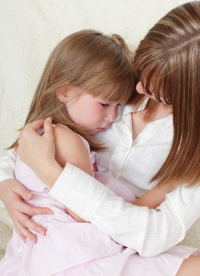by Katie Brazerol
 Many people will be honoring loved ones who have passed away this Memorial Day. However, many people hesitate to discuss death with children. While the topic can be uncomfortable, death is something everyone must face.
Many people will be honoring loved ones who have passed away this Memorial Day. However, many people hesitate to discuss death with children. While the topic can be uncomfortable, death is something everyone must face.
When discussing death with a child, first find out what he or she knows. Many children have misconceptions, fears, and worries surrounding the concept of death. While talking about it may not solve all their problems, you may be able to provide information, comfort, and a clearer understanding of what death means.
Conversations about death will vary depending on children’s ages, personal experiences, beliefs, and cultural customs. Here are some things to consider when talking about loss or death with a child:
Allow the child to ask questions. This will give you an idea of what is on the child’s mind. It will also give you a good starting point in your discussion. Keep your answers fairly simple and straightforward.
Ask the child for his or her thoughts. Asking a child, “What do you think death means?” will help give you an idea of how much the child understands. Many young children believe that death can be temporary or reversed. They struggle to understand that the person or pet is not coming back. Terms like eternal rest and rest in peace are often misunderstood by children, causing them to believe that the loved one is just sleeping.
Answer honestly. It can be hard to discuss a subject when you don’t know all the answers. It’s okay to respond to questions with, “I’m not sure” or “I don’t know, either.” Use your faith or beliefs as a basis for your thoughts about death, and allow the child to explore his or her ideas.
Validate feelings. Death can cause many feelings, including sadness, guilt, anger, and fear. Explain that all emotions being felt by the child are normal. There is no wrong or right way to feel.
Provide an outlet for emotions. Children may respond to death in different ways. Provide an outlet for the child to express his or her emotions. Offer paper and crayons for the child to draw freely while you are talking to him. Use dolls or stuffed animals to role-play while having the conversation. Provide many opportunities for the child to get physical activity.
 Remember together. Many people benefit from remembering good times with the loved one who has passed. Whether it was a human or a pet, help the child recall special times they had together. If possible, print off a photo of them together and frame it for the child.
Remember together. Many people benefit from remembering good times with the loved one who has passed. Whether it was a human or a pet, help the child recall special times they had together. If possible, print off a photo of them together and frame it for the child.
Watch for signs of grieving. Children may grieve in different ways. Watch for troubling signs, such as not eating, not sleeping, outbursts at child care, aggression, withdrawal, anxiety, or newly developed phobias. These behaviors require attention and may require help from a professional.
Talking about death might be uncomfortable for you and your child, but the conversation might clear up misconceptions and put some of your child’s fears to rest. Having someone to share memories with is also great therapy and a way to validate the relationship between your child and the loved one.
For more information, please visit the following websites:
- childdevelopmentinfo.com/how-to-be-a-parent/communication/talk-to-kids-death/
- hospicenet.org/html/talking.html
- fredrogers.org/parents/special-challenges/death.php
Books are great resources when helping children cope with loss or death. Here are a few suggestions. Many more books are available online and through your local library. Always screen books before reading them to children to make sure they are age-appropriate and fit your family’s beliefs.
- God Gave Us Heaven by Lisa T. Bergren
- The Next Place by Warren Hanson
- The Invisible String by Patrice Karst
- Someone I Love Died by Christine Harder Tangvald
- I Miss You: A First Look at Death by Pat Thomas
- I’ll Always Love You by Hans Wilhelm
Back to blog listing